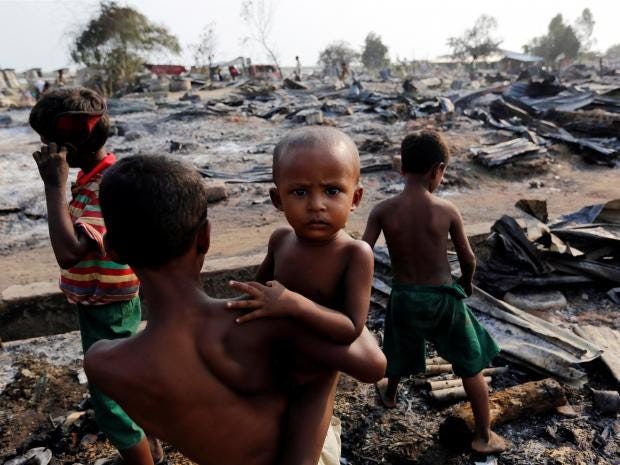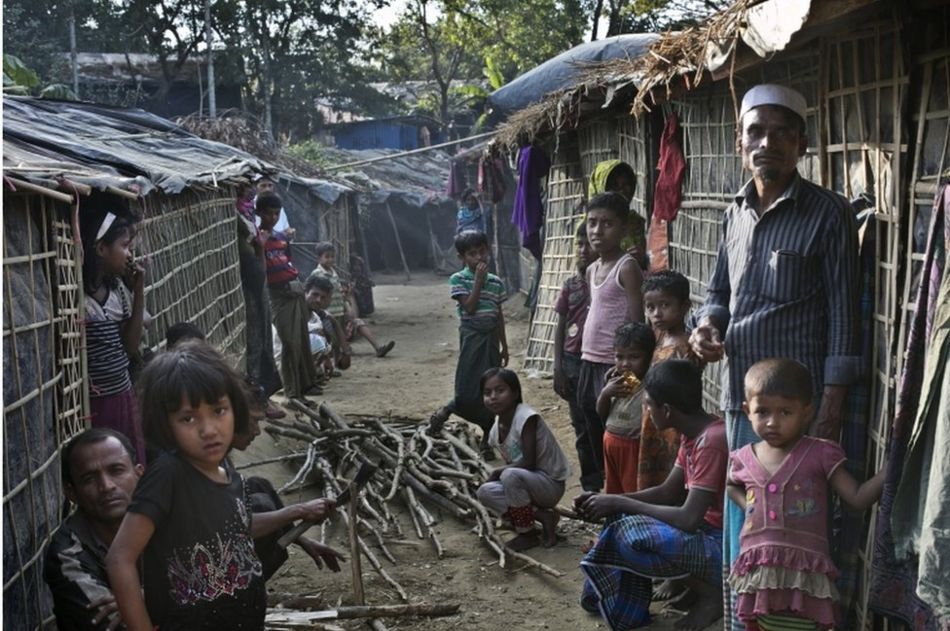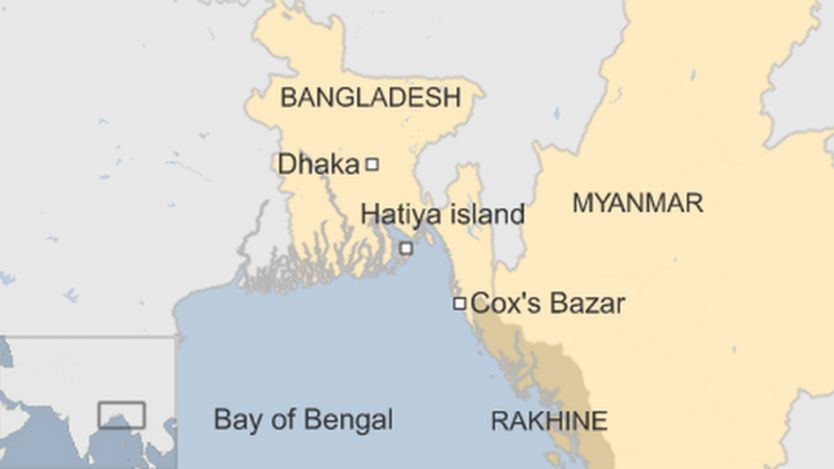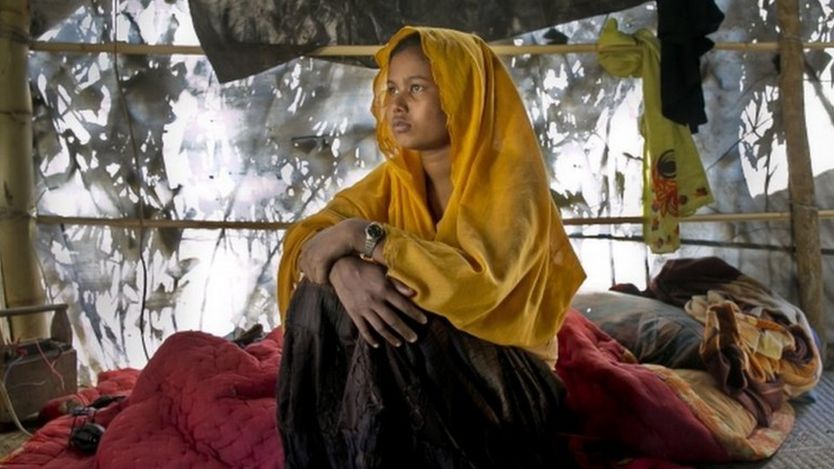Banglar Bir
SENIOR MEMBER

- Joined
- Mar 19, 2006
- Messages
- 7,805
- Reaction score
- -3
- Country
- Location
Malaysia calls for ASEAN to lead push for end to Rohingya crisis
Reuters, Yangon
Malaysia today said the plight of Rohingya Muslims in Myanmar was a regional concern and called for the Association of Southeast Asian Nations (ASEAN) to coordinate humanitarian aid and investigate alleged atrocities committed against them.
Malaysian Foreign Minister Anifah Aman was speaking at a meeting of the 10-nation bloc in Yangon called by Myanmar leader Aung San Suu Kyi after weeks of reports that the army has killed, raped and arbitrarily arrested Rohingya civilians.
Myanmar has denied the accusations, saying many of the reports are fabricated and it insists the strife in Rakhine State, where many Rohingya live, is an internal matter.
In addition to fending off diplomatic pressure over the crisis, the Myanmar government has also invited a handpicked media delegation to visit the affected region this week.
Anifah said events in Rakhine State were a matter of regional security and stability, noting that about 56,000 Rohingya now live in Muslim-majority Malaysia having fled previous unrest in Myanmar.
"We believe that the situation is now of a regional concern and should be resolved together," Anifah told the meeting, according to a transcript of his speech provided by the Malaysian Ministry of Foreign Affairs.
Progress in improving the human rights of the Rohingya had been "rather slow", he said, noting the stream of reports about abuses being committed in Rakhine State.
"A CAMPAIGN OF VIOLENCE"
Anifah also warned that Islamic State militants "could be taking advantage of this situation".
The government of predominantly Buddhist Myanmar has said that militants with links to Islamists overseas were behind attacks on security posts near Myanmar's border with Bangladesh, in the north of Rakhine State, on Oct. 9.
Myanmar troops have poured into the Muslim-majority area since the attacks that killed nine police officers.
At least 86 people have died and an estimated 27,000 Rohingya have fled to Bangladesh since Oct. 9.
Refugees, residents and human rights groups say Myanmar soldiers have committed summary executions, raped Rohingya women and burned homes.
The majority of the population in northern Rakhine State are Rohingya Muslims who are denied citizenship in Myanmar, where they are considered illegal immigrants from neighbouring Bangladesh.
Independent media and observers have been denied access to northern Rakhine State. Some Rohingya communities have also been off-limits to aid agencies on security grounds for more than two months, raising fears about the welfare of a population that was already experiencing high rates of malnutrition.
A group of journalists chosen by the Ministry of Information to represent domestic and international media was set to visit Maungdaw, the main site of the conflict, on Monday.
Officials did not invite most media organisations that have reported on the alleged abuses, including Reuters.
Efforts to rebut accusations of army abuses were undermined by the release of a lengthy report from Amnesty International on Monday, accusing Myanmar of "a campaign of violence against Rohingya people that may amount to crimes against humanity".
The rights group cited satellite images and testimony from Rohingya in Rakhine State and Bangladesh. Among myriad abuses, it alleged large-scale "enforced disappearances" of village elders and religious leaders in Maungdaw.
"While the military is directly responsible for the violations, Aung San Suu Kyi has failed to live up to both her political and moral responsibility to try to stop and condemn what is unfolding in Rakhine State," Rafendi Djamin, Amnesty International's director for Southeast Asia and the Pacific, said in a statement.
12:00 AM, December 20, 2016 / LAST MODIFIED: 11:57 PM, December 19, 2016
Indonesian minister here to discuss Rohingya issue
Seeks lasting solution

Retno Marsudi
Diplomatic Correspondent
Indonesia's Foreign Minister Retno Marsudi arrived in Dhaka last night to discuss with high government officials the current ethnic cleansing and persecution on the Rohingya Muslim minority in Myanmar's western state of Rakhine as well as finding a lasting solution to the Rohingya crisis.
During her 24-hour visit, she will be discussing Rohingya issues with Prime Minister Sheikh Hasina and her Bangladesh counterpart AH Mahmood Ali, and visit Ukhia to see the conditions of Rohingya refugees, according to diplomatic sources.
Marsudi came to Dhaka after attending a meeting along with the foreign ministers from the Association of Southeast Asian Nations (Asean) with Myanmar State Counsellor and Foreign Minister Aung San Suu Kyi in Yangon yesterday.
Myanmar leader Suu Kyi met with regional foreign ministers to tackle growing international criticism of her army's forceful treatment of the country's Rohingya minority, which some critics say, constitutes crimes against humanity.
She came to Bangladesh to talk about the Rohingya issues as Indonesia wants to comprehensively address problems related to Rohingyas fleeing along the Myanmar-Bangladesh border, said a foreign ministry official, adding all countries that attended the meeting in Yangon freely expressed their opinions in an effort to reduce regional concerns over a situation in northern Rakhine.
Human rights groups have accused the military of perpetrating mass murder, looting and rape against the Rohingya in Rakhine, where the army went on a counterinsurgency offensive after an October attack there on police outposts that killed nine officers.
According to Indonesian embassy officials, Foreign Minister Retno Marsudi will hold a bilateral meeting with Bangladesh Foreign Minister Mahmood Ali today and then together they fly for Cox's Bazar by helicopter to visit the Rohingya refugee camp in Ukhia.
Upon return from Ukhia, she will call on Prime Minister Sheikh Hasina at Gono Bhaban at 5:00pm and depart for Jakarta tonight.
In Myanmar, Marsudi asked Myanmar to open up Rakhine to humanitarian aid and assistance so the situation does not deteriorate for civilians in the impoverished area.
Myanmar has said that at least 93 people -- 17 police and soldiers and 76 alleged "attackers" (including six who reportedly died during interrogation) -- were killed and some 575 suspects detained in the October 9 attacks and a subsequent military crackdown.
Rohingya advocacy groups, however, claim that around 400 Rohingyas -- described by the United Nations as among the most persecuted groups worldwide -- were killed in the military operations, women were raped, and Rohingya villages torched.
On December 16, the UN's High Commissioner for Human Rights warned the Myanmar government that its “short-sighted, counterproductive, even callous” approach to handling the crisis could result in “grave long-term repercussions” for the country and the region.
“The repeated dismissal of the claims of serious human rights violations as fabrications, coupled with the failure to allow our independent monitors access to the worst affected areas in northern Rakhine, is highly insulting to the victims and an abdication of the government's obligations under international human rights law,” Zeid Ra'ad Al Hussein said in a statement.
Expressing “deep” disappointment that the UN Human Rights Office's requests for access had not received approval, he added, “If the authorities have nothing to hide, then why is there such reluctance to grant us access? Given the continued failure to grant us access, we can only fear the worst.”
Reuters, Yangon
Malaysia today said the plight of Rohingya Muslims in Myanmar was a regional concern and called for the Association of Southeast Asian Nations (ASEAN) to coordinate humanitarian aid and investigate alleged atrocities committed against them.
Malaysian Foreign Minister Anifah Aman was speaking at a meeting of the 10-nation bloc in Yangon called by Myanmar leader Aung San Suu Kyi after weeks of reports that the army has killed, raped and arbitrarily arrested Rohingya civilians.
Myanmar has denied the accusations, saying many of the reports are fabricated and it insists the strife in Rakhine State, where many Rohingya live, is an internal matter.
In addition to fending off diplomatic pressure over the crisis, the Myanmar government has also invited a handpicked media delegation to visit the affected region this week.
Anifah said events in Rakhine State were a matter of regional security and stability, noting that about 56,000 Rohingya now live in Muslim-majority Malaysia having fled previous unrest in Myanmar.
"We believe that the situation is now of a regional concern and should be resolved together," Anifah told the meeting, according to a transcript of his speech provided by the Malaysian Ministry of Foreign Affairs.
Progress in improving the human rights of the Rohingya had been "rather slow", he said, noting the stream of reports about abuses being committed in Rakhine State.
"A CAMPAIGN OF VIOLENCE"
Anifah also warned that Islamic State militants "could be taking advantage of this situation".
The government of predominantly Buddhist Myanmar has said that militants with links to Islamists overseas were behind attacks on security posts near Myanmar's border with Bangladesh, in the north of Rakhine State, on Oct. 9.
Myanmar troops have poured into the Muslim-majority area since the attacks that killed nine police officers.
At least 86 people have died and an estimated 27,000 Rohingya have fled to Bangladesh since Oct. 9.
Refugees, residents and human rights groups say Myanmar soldiers have committed summary executions, raped Rohingya women and burned homes.
The majority of the population in northern Rakhine State are Rohingya Muslims who are denied citizenship in Myanmar, where they are considered illegal immigrants from neighbouring Bangladesh.
Independent media and observers have been denied access to northern Rakhine State. Some Rohingya communities have also been off-limits to aid agencies on security grounds for more than two months, raising fears about the welfare of a population that was already experiencing high rates of malnutrition.
A group of journalists chosen by the Ministry of Information to represent domestic and international media was set to visit Maungdaw, the main site of the conflict, on Monday.
Officials did not invite most media organisations that have reported on the alleged abuses, including Reuters.
Efforts to rebut accusations of army abuses were undermined by the release of a lengthy report from Amnesty International on Monday, accusing Myanmar of "a campaign of violence against Rohingya people that may amount to crimes against humanity".
The rights group cited satellite images and testimony from Rohingya in Rakhine State and Bangladesh. Among myriad abuses, it alleged large-scale "enforced disappearances" of village elders and religious leaders in Maungdaw.
"While the military is directly responsible for the violations, Aung San Suu Kyi has failed to live up to both her political and moral responsibility to try to stop and condemn what is unfolding in Rakhine State," Rafendi Djamin, Amnesty International's director for Southeast Asia and the Pacific, said in a statement.
12:00 AM, December 20, 2016 / LAST MODIFIED: 11:57 PM, December 19, 2016
Indonesian minister here to discuss Rohingya issue
Seeks lasting solution

Retno Marsudi
Diplomatic Correspondent
Indonesia's Foreign Minister Retno Marsudi arrived in Dhaka last night to discuss with high government officials the current ethnic cleansing and persecution on the Rohingya Muslim minority in Myanmar's western state of Rakhine as well as finding a lasting solution to the Rohingya crisis.
During her 24-hour visit, she will be discussing Rohingya issues with Prime Minister Sheikh Hasina and her Bangladesh counterpart AH Mahmood Ali, and visit Ukhia to see the conditions of Rohingya refugees, according to diplomatic sources.
Marsudi came to Dhaka after attending a meeting along with the foreign ministers from the Association of Southeast Asian Nations (Asean) with Myanmar State Counsellor and Foreign Minister Aung San Suu Kyi in Yangon yesterday.
Myanmar leader Suu Kyi met with regional foreign ministers to tackle growing international criticism of her army's forceful treatment of the country's Rohingya minority, which some critics say, constitutes crimes against humanity.
She came to Bangladesh to talk about the Rohingya issues as Indonesia wants to comprehensively address problems related to Rohingyas fleeing along the Myanmar-Bangladesh border, said a foreign ministry official, adding all countries that attended the meeting in Yangon freely expressed their opinions in an effort to reduce regional concerns over a situation in northern Rakhine.
Human rights groups have accused the military of perpetrating mass murder, looting and rape against the Rohingya in Rakhine, where the army went on a counterinsurgency offensive after an October attack there on police outposts that killed nine officers.
According to Indonesian embassy officials, Foreign Minister Retno Marsudi will hold a bilateral meeting with Bangladesh Foreign Minister Mahmood Ali today and then together they fly for Cox's Bazar by helicopter to visit the Rohingya refugee camp in Ukhia.
Upon return from Ukhia, she will call on Prime Minister Sheikh Hasina at Gono Bhaban at 5:00pm and depart for Jakarta tonight.
In Myanmar, Marsudi asked Myanmar to open up Rakhine to humanitarian aid and assistance so the situation does not deteriorate for civilians in the impoverished area.
Myanmar has said that at least 93 people -- 17 police and soldiers and 76 alleged "attackers" (including six who reportedly died during interrogation) -- were killed and some 575 suspects detained in the October 9 attacks and a subsequent military crackdown.
Rohingya advocacy groups, however, claim that around 400 Rohingyas -- described by the United Nations as among the most persecuted groups worldwide -- were killed in the military operations, women were raped, and Rohingya villages torched.
On December 16, the UN's High Commissioner for Human Rights warned the Myanmar government that its “short-sighted, counterproductive, even callous” approach to handling the crisis could result in “grave long-term repercussions” for the country and the region.
“The repeated dismissal of the claims of serious human rights violations as fabrications, coupled with the failure to allow our independent monitors access to the worst affected areas in northern Rakhine, is highly insulting to the victims and an abdication of the government's obligations under international human rights law,” Zeid Ra'ad Al Hussein said in a statement.
Expressing “deep” disappointment that the UN Human Rights Office's requests for access had not received approval, he added, “If the authorities have nothing to hide, then why is there such reluctance to grant us access? Given the continued failure to grant us access, we can only fear the worst.”





















